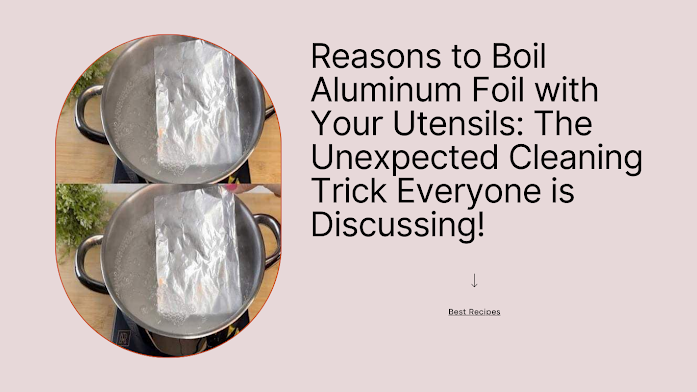Keeping utensils clean and shiny can be a challenging task, especially when dealing with tarnished silverware or stubborn stains. But did you know that boiling aluminum foil with your utensils can make them look brand new? This simple, science-backed cleaning hack is taking the internet by storm for its effectiveness and ease. Here's why this method works and how you can try it yourself.
Why Boil Aluminum Foil with Utensils?
1. Restores Shine to Tarnished Silverware
When silver utensils tarnish, it’s due to a chemical reaction where silver sulfide forms on the surface. Boiling aluminum foil in water creates a reaction that removes the tarnish, leaving your utensils shiny and clean.
2. Removes Stubborn Stains
Stains on stainless steel utensils can be tough to scrub off. Aluminum foil in boiling water, combined with baking soda, helps break down residue without abrasive scrubbing.
3. Eco-Friendly Cleaning Solution
This method reduces the need for harsh chemical cleaners, making it a more environmentally friendly way to clean your utensils.
4. Cost-Effective
Aluminum foil is inexpensive and readily available, making this cleaning trick budget-friendly.
5. Saves Time
Instead of scrubbing each utensil individually, this method allows you to clean multiple pieces at once in a pot, saving time and effort.
How Does It Work?
This trick relies on a basic scientific reaction called ion exchange. When aluminum foil, baking soda, and hot water come into contact, the aluminum reacts with the tarnish (silver sulfide) on your utensils. The aluminum essentially "pulls" the sulfur atoms away from the silver, restoring its original shine.
What You'll Need
- Aluminum foil
- A large pot
- Water
- 1–2 tablespoons baking soda
- Utensils or tarnished silverware
- Tongs (optional, for handling hot utensils)
Step-by-Step Instructions
Line the Pot with Aluminum Foil
- Tear off a piece of aluminum foil and place it at the bottom of a large pot, shiny side up.
Fill the Pot with Water
- Add enough water to fully submerge your utensils or silverware.
Add Baking Soda
- Stir in 1–2 tablespoons of baking soda. The baking soda helps create the chemical reaction needed to lift stains and tarnish.
Add Your Utensils
- Place your utensils or tarnished silverware into the pot, ensuring they’re in contact with the aluminum foil.
Boil the Water
- Bring the water to a boil and let the utensils soak for 3–5 minutes. You may notice bubbles forming as the reaction occurs.
Rinse and Dry
- Use tongs to carefully remove the utensils and rinse them under cool water. Dry immediately with a clean towel to prevent water spots.
Tips for Best Results
- Use Fresh Aluminum Foil: Old or reused foil may not produce the same effect due to reduced reactivity.
- Avoid Wooden or Non-Metal Handles: This method is best for all-metal utensils or silverware. Wooden or plastic components may be damaged by boiling water.
- Repeat if Necessary: For heavy tarnish or stains, you may need to repeat the process.
What Can You Clean with This Method?
- Silverware
- Stainless steel utensils
- Serving trays
- Metal baking tools
- Jewelry (ensure it’s pure silver or stainless steel)
What to Avoid
- Non-Stainless Steel Cookware: This trick works best for silver and stainless steel. Avoid aluminum utensils, as they might react differently.
- Delicate or Antique Items: For delicate heirloom silverware, consult a professional to avoid damage.
The Science Behind the Magic
The combination of aluminum foil, baking soda, and boiling water creates an electrolytic reaction. Aluminum acts as a sacrificial metal, attracting the sulfur atoms from the silver sulfide tarnish. This reaction effectively "reverses" the tarnishing process without damaging the silver or stainless steel.
Why This Trick is Going Viral
This cleaning method is a classic hack that’s gaining popularity because it’s simple, affordable, and surprisingly effective. People love sharing tips that use everyday household items for tasks that seem complex, and this trick delivers fantastic results without any harsh chemicals or elbow grease.
Final Thoughts
Boiling aluminum foil with your utensils is more than just a cleaning trick—it’s a practical, science-backed solution to keeping your kitchenware looking like new. Whether you’re tackling tarnished silverware or stubborn stains, this method is worth trying for its simplicity and effectiveness. Next time your utensils need a refresh, grab some aluminum foil, baking soda, and a pot of water, and let this clever hack do the work for you!












